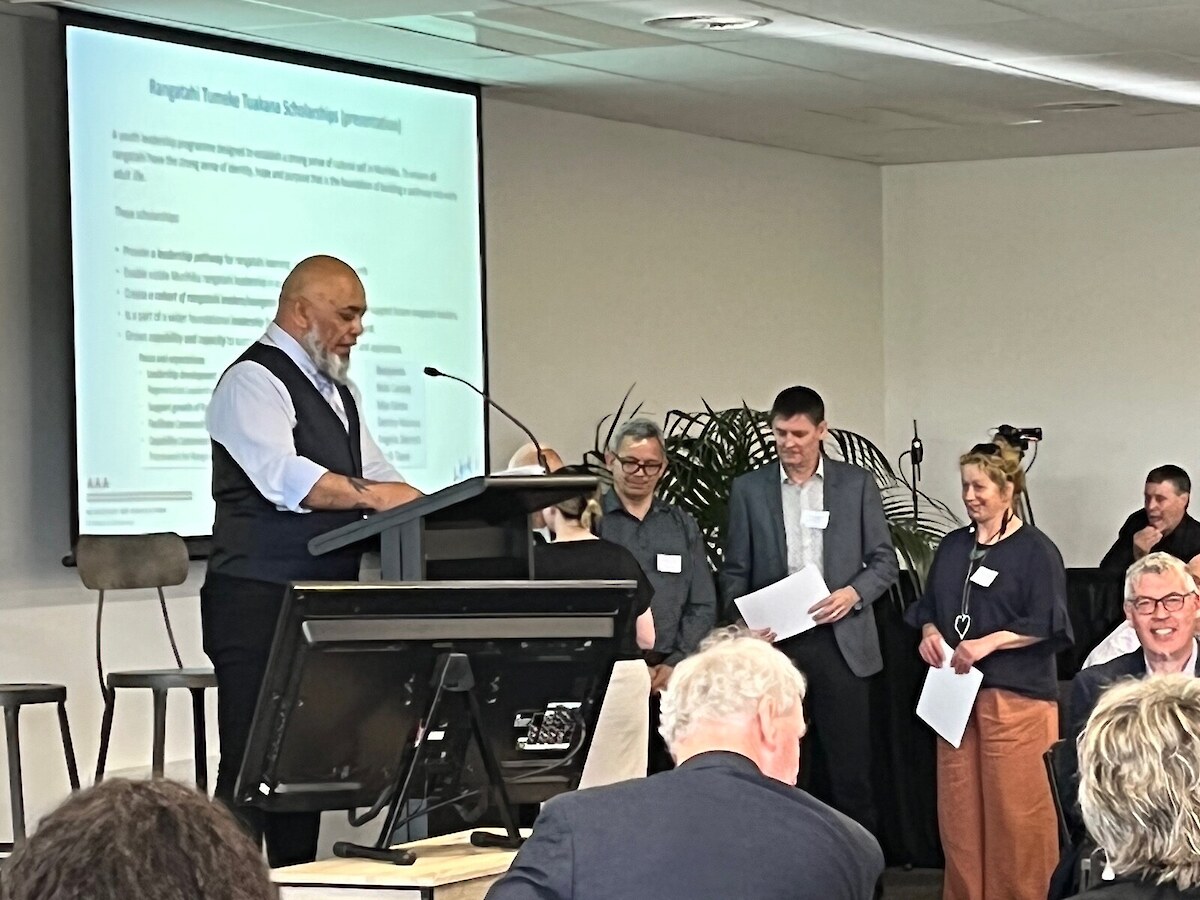Murihiku Regeneration would like to thank the following sponsors for making this event possible:
- Fortescue Future Industries
- Hyundai New Zealand - providing the Hyundai Nexo that visited all secondary schools in Invercargill
- HWR Richardson - the venue at Transport World
- PGG Wrightson
- Meridian Energy
- Contact Energy
- Hokonui Rūnanga
- Public Sector: Ministry of Education, Te Puni Kōkiri, Ministry of Social Development and Ministry of Business Innovation and Employment
Special thanks to Ra Dallas - MC for the event.
Thanks also to Sono Sound Systems.
 Special thanks to Ra Dallas for his quick wit and excellent MC skillsIntroduction to event
Special thanks to Ra Dallas for his quick wit and excellent MC skillsIntroduction to event
The people of Murihiku have a once in a lifetime opportunity to leverage the closure of Tiwai Smelter and the greening of economic activity more generally, into a regenerative kaupapa. A kaupapa of sustainability and quality of life in a thriving, healthy environment for generations to come. Science and innovation will be the vital drivers of our future success. We know this because science and innovation are pivotal to responding to the challenges we face, including:
- Tiwai Smelter closure, the loss of jobs, and the remediation of the site.
- Climate change, environmental decline, and sustainability.
- Ensuring we can utilise green energy innovations to decarbonise human activity.
- The pace of technological change and its impact on the future of work.
The event was opened by Murihiku Upoko Michael Skerrett.
E ngā mana, e ngā reo, rau rangatira mā
Piki mai, kaki mai, nau mai, haere mai
Ki tēnei o tātou Wānanga Āhuatanga o te Ao
Haere mai, haere mai, haere mai
E hoa mā, ko mutu rā to tātou wānanga
Noreira nei rā te mihi ki a koutou
Mō koutou āwhina ki te kaupapa nei
He mihi nui, he mihi aroha
Hoki ora ai atu ki ōu koutou kāinga
I raro te Atawhai o to tātou Ariki
Haere atu rā
Michael Skerrett - Upoko
Presentations - day 1
Session One. Opening Remarks: Ngāi Tahu ki Murihiku and Crown representative
A partnership for regeneration. Speakers: Tā Tipene O’Regan and Hon Megan Woods
Session Two. Murihiku Regeneration: Purpose, priorities and focus of action
- Work-stream foci “Back to the future? (PDF, 105.16 kB)”. Speaker: Dr Michael Stevens
- Scale and scope of opportunity (PDF, 1.37 MB). Speaker: Terry Nicholas
- Capability, the role of education and training (PDF, 2.47 MB). Speaker: Ivan Hodgetts
- Regenerating our whenua. Speakers: Riki Parata and Jana Davis
Session Three. Global Context to Local Practice: Decarbonisation and green energy
- Decarbonisation and green energy: the hydrogen opportunity. Speaker: Dr Andrew Forest AO, Fortescue Group (pre-recorded)
Watch the Fortescue video about hydrogen - the most abundant element on earth
- Green energy: how in an NZ Context. Speaker: Prof Sally Brooker, University of Otago
- Generators: Decarbonisation and green energy and the green hydrogen project. Speakers: Guy Waipara, Meridian Energy; James Flannery, Contact Energy
Session Four. Primary production: the future of food and fibre
- Food and fibre production and regenerative agriculture. Speakers: Prof Frank Griffin (University of Otago) and Milton Munro (PGG Wrightson)
Session Five. Government enablement: shifting practice in procurement
MOE procurement, on system shift. Speaker: Aditi Cook (Chief Procurement Officer, Ministry of Education)
Session Six. The voice of youth - intergenerational transformation
- Rangatahi Tumeke Group. Speakers: Mya Kairau, Nola Cassidy, Jacob Taare, Destiny Naunau, Angelia Skerrett
Presentations - day 2
Session One. Tiwai: Situation and way forward
- Speakers from the RPS Group: Arnaud Deutsch, Tim Cope, Ruairi Hanly, Alister Kingston
Session Two. Workshopping collaboration and partnership (part one)
- Options: Green Energy (Mike Shatford) or Food and Fibre (Prof Frank Griffin and Milton Munro)
Session Three. Workshopping collaboration and partnership (part two)
- Options: Tiwai Closure (Dr Michael Stevens) or Capability and Education (Ivan Hodgetts)
A series of posters was developed to provide background and context to the Tiwai situation. Download them below:
- Poster 1: Cultural signficance (PDF, 3.30 MB) - background
- Poster 2: Newspaper clippings (PDF, 1.82 MB) - highlighting cultural importance of Tiwai Point
- Poster 3: Ecological significance (PDF, 14.00 MB) of Tiwai Peninsula and surrounds
- Poster 4: Ecological systems (PDF, 7.84 MB) - highlighting contaminant movement pathways
- Poster 5: Te Ao Māori and remediation (PDF, 10.81 MB)
